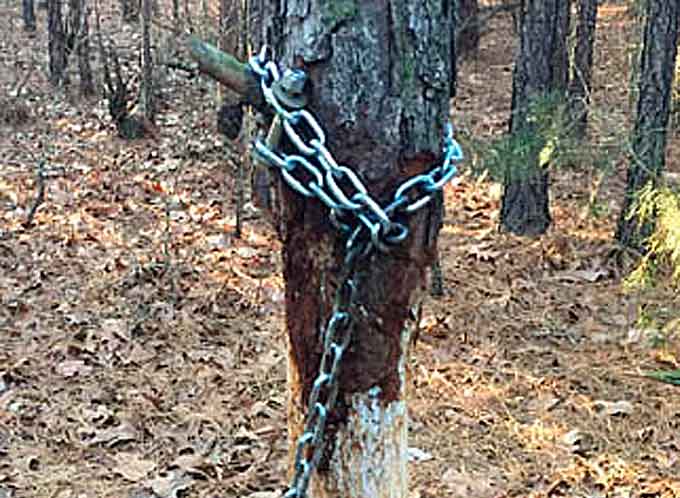
A Moore County man pled guilty to federal dog fighting and conspiracy charges yesterday, announced United States Attorney Matthew G.T. Martin and Acting Assistant Attorney General Jeffrey H. Wood of the Justice Department’s Environment and Natural Resources Division.
Brexton Redell Lloyd, 54, of Eagle Springs, North Carolina, pled guilty to one felony count of conspiracy and two felony counts of possession and training a dog intended for use in an animal fighting venture, contrary to the animal fighting provisions of the federal Animal Welfare Act.

Each count carries a maximum sentence of five years in prison and a $250,000 fine.
According to documents filed with the court, Lloyd participated with Justin “Jay” Love and others in a multi-state dog fighting conspiracy.
These documents describe Lloyd and Love’s attempt to set up a dog fight between Lloyd and an unknown opponent in October 2015 and Lloyd’s breeding and training activities.
Court documents further note that earlier this year, agents seized thirteen pit bull-type dogs from Lloyd’s residence.

- Ten of the dogs were secured outdoors by excessive chains, wearing thick collars, and positioned so that each dog was out of reach of any other dog.
- The other dogs were housed individually in pens.
- The water in the dogs’ bowls was frozen.
- Two of the four adult dogs seized exhibited scars consistent with dog fighting, and a third adult dog had four fractured teeth.
- In addition to the dogs, agents seized items related to training dogs for dog fighting purposes, including: a spring pole, a dog harness, and a hanging scale.
- Agents also seized veterinary supplies, including: intravenous fluids, intravenous administration sets stated for “Veterinary Use Only,” injectable and other antibiotics, a 100-count package of syringes, blood clotting medications such as Blood Stop Powder, and a skin stapler.
“Organized crime has no place in North Carolina or the United States – and dog fighting of this sort is nothing short of organized crime,” said United States Attorney Martin.

“Our law enforcement partners at the Department of Agriculture, the Federal Bureau of Investigation, the Moore County Sheriff’s Office, and the N.C. State Highway Patrol demonstrated exceptional coordination in bringing this defendant to justice.”
“Ending animal fighting ventures is a priority of our Division,” said Acting Assistant Attorney General Wood.
“We dispatch prosecutors who focus in this area to districts across the country, to join with our partners in the U.S. Attorneys’ Offices in aggressively pursuing illegal animal fighting.”
“Today’s sentence sends a message that our justice system will not tolerate the torment and death of animals in the fighting ring, all for the sake of illegal gambling.”
(Learn More. WARNING: Graphic Video. A four month-long investigation led to the rescue of 50 dogs from a suspected dogfighting operation in Sevier County, Tennessee, and the arrest of three people. Courtesy of The Humane Society of the United States and YouTube)
“The provisions of the Animal Welfare Act were designed to protect animals from being used in illegal fighting ventures, which often entail other forms of criminal activity involving drugs, firearms and gambling,” said Department of Agriculture – Office of Inspector General Special Agent-in-Charge Bethanne M. Dinkins.
“Together with the Department of Justice, animal fighting is an investigative priority for USDA-OIG, and we will work with our law enforcement partners to investigate and assist in the criminal prosecution of those who participate in animal fighting ventures.”

This case is part of Operation Grand Champion, a coordinated effort across numerous federal judicial districts to combat organized dog fighting.
The phrase “Grand Champion” is used by dog fighters to refer to a dog with more than five dog fighting “victories.”
To date, over one hundred dogs have been rescued as part of Operation Grand Champion, and either surrendered or forfeited to the government.
The Humane Society of the United States assisted with the care of the dogs seized by federal law enforcement.
This case was investigated by USDA-OIG and FBI, with assistance from the Moore County Sheriff’s Office and the North Carolina Highway Patrol, and is being prosecuted by Assistant U.S. Attorney JoAnna G. McFadden and Trial Attorney Erica H. Pencak of the Justice Department’s Environmental Crimes Section Environmental Crimes Section.
In 2014, the Department of Justice designated the Environment and Natural Resources Division as the centralized body within the Department responsible for tracking, coordinating, and working with the U.S. Attorneys’ Offices on animal cruelty enforcement matters.
Learn About the Animal Welfare Litigation Program
Together with the U.S. Attorneys’ Offices, Environment and Natural Resources Division (ENRD) lawyers are working to ensure that full effect is given to the federal statutes and enforcement regimes that provide for the humane treatment of captive, farmed, and companion animals across the United States.
The principal federal agency that ENRD represents in this area is the U.S. Department of Agriculture.
(See the ASPCA on ground in Huntersville, NC, assisting law enforcement with the rescue and removal of 23 dogs from a property where they were allegedly used for fighting. Courtesy of the ASPCA and YouTube)
Where appropriate, ENRD’s Environmental Crimes Section (ECS) brings criminal prosecutions under these laws against, for example, people who are involved in the illegal blood sport of dog fighting.
In these cases, ECS works with investigatory agents from the Department of Agriculture’s Office of the Inspector General, the Federal Bureau of Investigation, and other law enforcement agencies.
ENRD now has Departmental responsibility for affirmative litigation arising from the Nation’s animal protection laws, including: ENRD’s Wildlife and Marine Resources Section (WMRS) brings civil judicial enforcement actions that support and complement the administrative enforcement actions taken by the relevant federal agencies, including the Department of Agriculture’s Animal and Plant Health Inspection Service.
WMRS can also pursue civil remedies, such as civil forfeiture in animal-fighting cases.
- The Animal Welfare Act, 7 U.S.C. § 2131, et seq.
- The Horse Protection Act, 15 U.S.C. § 1821, et seq.
- The Humane Methods of Slaughter Act, 7 U.S.C. § 1901, et seq.
- The 28-Hour Law, 49 U.S.C. § 80502
- The Animal Crush Video Statute, 18 U.S.C. § 48
- The Animal Fighting Venture Prohibition Act, 18 U.S.C. § 49
For an introduction to these laws, see the September 2015 volume of the United States Attorney’s Bulletin.
For more information on the Department’s efforts, visit: https://www.justice.gov/enrd/animal-welfare.
















